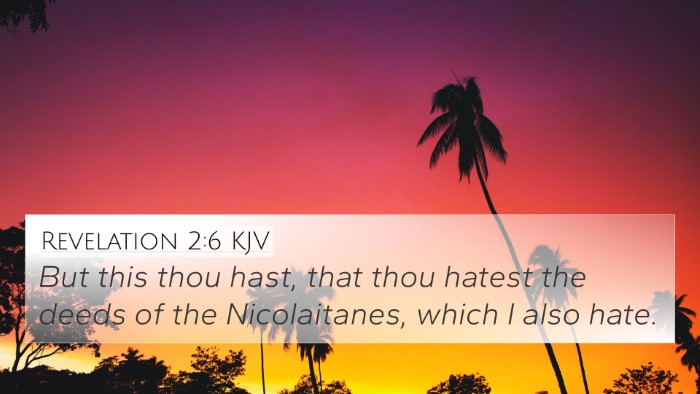Understanding Revelation 2:15
Verse: Revelation 2:15 - "So hast thou also them that hold the doctrine of the Nicolaitans, which thing I hate."
This verse addresses the church in Pergamos, highlighting the presence of false teachings, specifically the doctrine of the Nicolaitans. To provide an in-depth understanding, we will explore insights from multiple public domain commentaries, including Matthew Henry, Albert Barnes, and Adam Clarke.
Context of Revelation 2:15
Introduction: The Book of Revelation is a prophetic text filled with symbolism and messages for the early churches. The letter to the church in Pergamos warns against compromising the true faith with false teachings.
Summary from Commentaries
-
Matthew Henry's Commentary
Matthew Henry emphasizes the danger of adopting the teachings of the Nicolaitans, who are believed to promote licentious behavior and a disregard for scriptural holiness. He notes that the presence of such doctrine indicates a spiritual decline and the need for the church to maintain purity in faith.
-
Albert Barnes' Notes
Albert Barnes provides insight into the Nicolaitans, describing them as a sect that fostered moral laxity and spiritual error. He cautions the church against mingling with such falsehoods and stresses that God's hatred for these teachings speaks to His holy nature. Barnes encourages believers to discern truth from error.
-
Adam Clarke's Commentary
Adam Clarke elaborates on the identity of the Nicolaitans, suggesting they may have been followers of a heretical leader. He underscores the Apostle John's role in warning the church about this group. Clarke connects this verse to the overarching theme of maintaining doctrinal fidelity in the face of external pressures.
Thematic Insights
The central theme of Revelation 2:15 revolves around discernment, fidelity to God’s teachings, and the repudiation of false doctrines. The verse serves as a reminder that the church must remain vigilant against influences that distort the truth.
Related Bible Cross-References
In understanding Revelation 2:15, several cross-references illuminate the significance of holding fast to sound doctrine:
- 1 Timothy 6:3: "If any man teach otherwise, and consent not to wholesome words, even the words of our Lord Jesus Christ..." - emphasizing the importance of sound doctrine.
- 2 Peter 2:1: "But there were false prophets also among the people, even as there shall be false teachers among you..." - a warning about the rise of heretical teachings.
- Revelation 2:2: "I know thy works, and thy labor, and thy patience..." - identifying the contrast between true and false practices within the church.
- Jude 1:4: "For there are certain men crept in unawares, who were before of old ordained to this condemnation..." - recognizing the infiltration of false teachings within communities of faith.
- Romans 16:17: "Now I beseech you, brethren, mark them which cause divisions and offenses contrary to the doctrine which ye have learned..." - advising believers to be cautious of those promoting divisive teachings.
- Matthew 7:15: "Beware of false prophets, which come to you in sheep's clothing..." - Jesus’ warning against those who mislead others spiritually.
- Acts 20:29-30: "For I know this, that after my departing shall grievous wolves enter in among you, not sparing the flock..." - Paul’s foresight of false teachings entering the church.
The Importance of Doctrinal Integrity
From this verse and the related cross-references, we can glean several principles regarding the importance of doctrinal integrity:
- Discernment: Believers are called to actively discern between truth and error, seeking wisdom from scripture.
- Unity in Doctrine: The early church maintained unity through adherence to the apostles’ teachings, highlighting the necessity of sound doctrine.
- Resistance against Falsehood: There is a clear directive to resist teachings that contradict biblical principles, underscoring God's aversion to such doctrines.
Tools for Bible Cross-Referencing
Understanding how to cross-reference Bible verses can enhance the study of scripture. Here are some helpful tools and methods:
- Bible Concordance: A comprehensive tool that lists words and phrases to help locate relevant scriptures.
- Bible Cross-Reference Guide: A resource that connects verses on similar themes, assisting in thematic studies.
- Cross-Reference Study Bibles: Many Bibles come with built-in cross-references for easier navigation.
- Digital Bible Study Tools: Online platforms that provide extensive cross-referencing and thematic connections.
- Bible Commentaries: Scholarly works that often include cross-references and thematic links.
Identifying Connections Between Bible Verses
When studying Revelation 2:15, consider how it connects with other scriptures. For instance:
- Comparative Bible Verse Analysis: Drawing parallels between similar warnings found in the New Testament encourages a deeper understanding of God’s expectations.
- Thematic Bible Verse Connections: Exploring themes such as purity, holiness, and discernment across scripture reveals God's consistent message.
Conclusion
Revelation 2:15 serves as a powerful admonition regarding the dangers of false teachings within the church. By referencing trusted commentaries and cross-referencing related verses, believers can gain a clearer understanding of the necessity for doctrinal integrity and vigilance against spiritual deception.
Keyword Integration: This analysis utilizes primary, secondary, and long-tail keywords centered around Bible verse connections and cross-referencing, effectively addressing the search intent of those seeking in-depth biblical understanding.
The study of scripture through methods like cross-referencing enriches one's faith and helps maintain focus on the truth of God's Word. It empowers believers to identify and combat falsehood, ensuring that their understanding of scripture aligns with God’s intended message.



